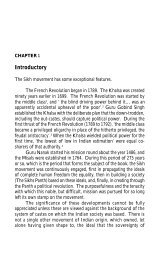Fundamentalism and the Sikh Religious Tradition by T.N. Madan
Fundamentalism and the Sikh Religious Tradition by T.N. Madan
Fundamentalism and the Sikh Religious Tradition by T.N. Madan
You also want an ePaper? Increase the reach of your titles
YUMPU automatically turns print PDFs into web optimized ePapers that Google loves.
you want to play <strong>the</strong> game of love, enter my lane with your head on thy palm" <strong>and</strong> "Truth<br />
is higher than every thing; higher still is truthful living."<br />
Fur<strong>the</strong>r, <strong>the</strong>re are four clear responsibilities of <strong>the</strong> spiritual man, which are<br />
specifically prescribed <strong>by</strong> Guru Nanak. First is <strong>the</strong> duty of maintaining equality between<br />
man <strong>and</strong> man, <strong>and</strong> man <strong>and</strong> woman. His call that <strong>the</strong>re is 'No Hindu nor any Mussalman',<br />
<strong>and</strong> his taking a Muslim Marasi (a low caste in <strong>the</strong> Brahminical system) as his first life<br />
companion, was a major blow to <strong>the</strong> hierarchical caste ideology. Caste ideology <strong>and</strong><br />
immobility of caste duties governed <strong>the</strong> entire empirical life in Hinduism. An allied step<br />
he took was <strong>the</strong> creation of <strong>the</strong> institution of Langar, (community kitchen), involving help<br />
to <strong>the</strong> poor <strong>and</strong> equality of status for one <strong>and</strong> all. The second responsibility which he<br />
prescribed was that of work, involving production <strong>and</strong> <strong>the</strong> sustenance of life. He wrote<br />
"The person incapable of earning his living gets his ears split, <strong>and</strong> becomes a mendicant.<br />
He calls himself a guru or a saint. Look not upto him <strong>and</strong> touch not his feet. He knows<br />
<strong>the</strong> true path who earns his living <strong>and</strong> shares his earnings with o<strong>the</strong>rs." He fur<strong>the</strong>r<br />
emphasizes <strong>the</strong> religious necessity <strong>and</strong> responsibility of equitable distribution of wealth,<br />
saying, "God's bounty belongs to all but in <strong>the</strong> world it is maldistributed" <strong>and</strong>, 'riches<br />
cannot be ga<strong>the</strong>red without sin, but do not keep company after death. He, thus,<br />
condemned exploitation <strong>and</strong> accumulation of wealth, <strong>and</strong> demonstrated his censure of it,<br />
<strong>by</strong> acceptance of <strong>the</strong> invitation of Bhai Lalo, a poor carpenter, <strong>and</strong> rejecting that of Malik<br />
Bhago, <strong>the</strong> wealthy local chief. The most significant responsibility, which is often missed<br />
<strong>by</strong> casual scholars, is that of confrontation with <strong>the</strong> unjust <strong>and</strong> <strong>the</strong> oppressors. This<br />
responsibility logically follows from his description of God, whom he calls <strong>the</strong> "True<br />
Emperor", <strong>the</strong> 'Protector', <strong>the</strong> 'Shelter of <strong>the</strong> Shelterless', <strong>the</strong> 'Helper of <strong>the</strong> helpless', <strong>and</strong><br />
what is very significant, <strong>the</strong> 'Destroyer of <strong>the</strong> Evil', '<strong>the</strong> Destroyer of <strong>the</strong> Demonical', <strong>and</strong><br />
'<strong>the</strong> Slayer of <strong>the</strong> Inimical."<br />
In this context, two aspects of <strong>the</strong> Bani of Guru Nanak, are very important. First,<br />
he is critical of <strong>the</strong> failure of <strong>the</strong> rulers to secure justice, fairness <strong>and</strong> safety for <strong>the</strong>ir<br />
subjects, <strong>and</strong> to resist <strong>and</strong> repel <strong>the</strong> invaders whose butchery <strong>and</strong> tyranny he condemns.<br />
He goes to <strong>the</strong> extent of ridiculing religious persons who were depending upon Mantras<br />
lo make <strong>the</strong> invading hordes blind or invoking <strong>the</strong> protection of <strong>the</strong> Devis <strong>and</strong> Devitas<br />
against <strong>the</strong> enemy. He criticised corruption at all levels of <strong>the</strong> administration <strong>and</strong> social<br />
life. The second fact is his complaint to God for allowing <strong>the</strong> weak to be oppressed <strong>by</strong> <strong>the</strong><br />
strong <strong>and</strong> <strong>the</strong> consequent failure of <strong>the</strong> Master to protect his flock. This Bani of Guru<br />
Nanak is not idle rhetoric, but it lays down an emphatic direction as to what is necessary<br />
<strong>and</strong> virtuous for <strong>the</strong> religious man to do <strong>and</strong> <strong>the</strong> targets for which his Panth has always to<br />
struggle to achieve. It is in this background, that Guru Nanak directed <strong>the</strong> futility of some<br />
earlier ethical injunctions saying that people did not know what was sin <strong>and</strong> what was not<br />
sin, <strong>and</strong> if <strong>the</strong>re was any piety involved in avoiding meat-eating. He wrote : Men<br />
discriminate not <strong>and</strong> quarrel over meat-eating. They do not know what is flesh or nonflesh<br />
<strong>and</strong> what is sin or non-sin". This being his st<strong>and</strong> regarding Ahimsa, he explained<br />
that <strong>the</strong>re was life in every grain of food man ate. The obvious inference is that since he<br />
envisages his society to confront <strong>and</strong> resist injustice <strong>and</strong> oppression, <strong>and</strong> since injustice<br />
<strong>and</strong> oppression are greatest <strong>by</strong> <strong>the</strong> rulers, <strong>the</strong> State or <strong>the</strong> invaders, it is he who clearly<br />
removes <strong>the</strong> hurdle of Ahimsa in <strong>the</strong> life <strong>and</strong> development of his society that could<br />
possibly arise in its pursuing or fulfilling its responsibilities of resisting or removing<br />
social injustice.
















